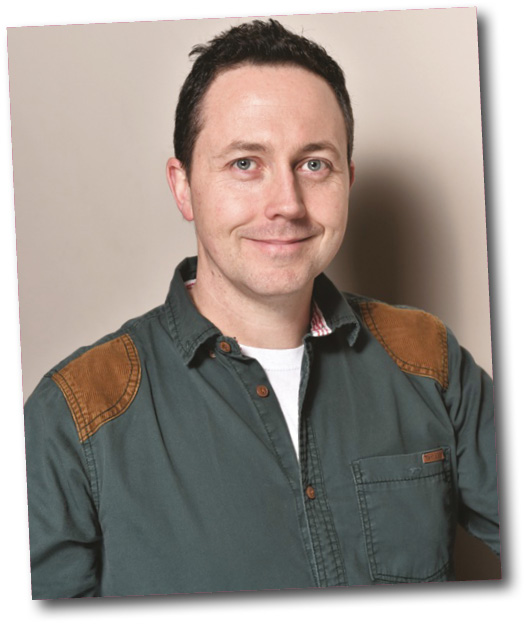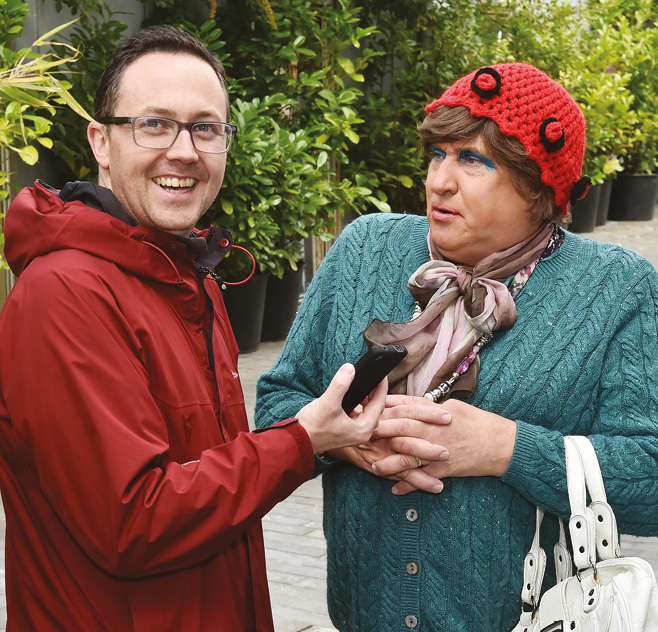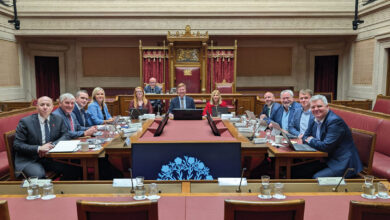Meet the Media


Michael Devlin, editor of the County Tyrone weekly, the Strabane Chronicle, talks about how his love of writing inadvertently drove him in to journalism, staying relevant in the digital age and offers some food for thought on his cooking hobby.
How did you get into journalism?
It was like falling down a flight of stairs in slow motion… **Deep cleansing breath**… I finished a French degree and went to work for Eircom in Dublin (nothing to do with the French whatsoever of course) but despite the new and happy concept of disposable income after being a student, I soon realised I was unfulfilled. I had always enjoyed writing in school and at university but when I tried writing a book, I also soon realised that making a living from that was years or even decades away, if it was possible at all. More for a bit of craic than anything else, I submitted a feature story to In Dublin Magazine and was astonished to discover they wanted to pay me £100. The lightbulb popped into existence and through some good luck and naïve perseverance, I managed to nail down a job some years later with the Strabane Chronicle (in 2003, I think). I have the then editor Darach MacDonald at the ‘Chronicle and the Ulster Herald to thank for taking a chance on me.
Describe your typical working day
There’s no such thing as a typical day for me – which is great – although there are some things that I find myself doing a lot (I write two columns and review films). As well as subbing the odd piece of copy, writing any manner of stories, maintaining the website, I also design pages and have even been known to take the odd photograph. We’re a small team at the Strabane Chronicle (albeit with ample help from colleagues at our sister paper the Ulster Herald), so you have to be able to fill any number of roles, from council meetings, court reporting, news stories, features, interviews, making tea, taking the wheelie bin out… the list goes on. It’s like a kaleidoscope of journalistic deadliness.
Who would you identify as your role models in the industry and why?
Honestly… I don’t really have any role models in the industry; I barely know anyone outside my own cosseted corner of creation, although I do admire the work ethic and talent in a great many colleagues and friends. I’ve been lucky enough to work with some cracking writers as well as some colourful characters and I can honestly say, I’m personally all the more colourful for the experience. I’m still working on the cracking.
What is it about journalism that you enjoy?
Writing. Meeting the great and the good is never dull and helping others out when it comes to shedding light on injustices is always well and truly satisfying, but most of all I love the writing. It’s cathartic, rewarding, fun and it lets me tap into my anarchic creative side. I would even say it’s a compulsion. Everything else – holding the establishment to account, toiling over press releases, design, interviews, pretending to be a professional – is just another means to an end and that end is writing the next story or preferably, the long-winded feature where I’m given free rein to wander among the words. For me, the day I’m told I can’t write anymore is the day journalism stops.
What would you describe as your most notable story or project?
I’m not sure. There are features I’ve taken great pleasure from and which I’ve deeply enjoyed writing but as for All the President’s Men sort of stuff, I’m probably found wanting. That said, I derive great satisfaction though from those long-winded features I mentioned (gonzo jobs on parachute jumps, canoeing down the Liffey, hiking the north west of Ireland leg of the Appalachian Trail etc) but those can be few and far between. Actually, of those columns I said I write, one is about food (and being a greedy-gut in general) and on the back of that I self-published a book, The Taste Diaries. I’m probably most proud of that. I still have a few copies in my attic if you want one. Three for a fiver!
How is journalism embracing the digital revolution?
The modern print conundrum! The digital revolution has taken over the world and like everybody and every other profession, we’re being towed along whether we like it or not. Every publication has an online presence these days, ours we try to keep ticking over as much as we can (even though we’re a weekly publication) but it’s difficult when you’re competing with the BBC and Guardian apps of this world. Journalism has had no choice but to embrace this revolution but in my view, there’s no substitute for a hard copy, in our case a freshly minted copy of the Strabane Chronicle, a mug of strong tea and a four-finger KitKat. You don’t get newsprint on your fingers from browsing Facebook! Gawd, but I hate Facebook.

What advice would you give anyone starting out in the profession?
I’m the last person who should be giving anyone advice. I basically fluked my way into this through a combination of blind luck and blagging. Thank God I managed to get better at it over time. I suppose if someone twisted my arm, I’d say, “Stay in school, kids. Eat your greens. And thank God for your health.” Seriously though, if you want to get into print journalism, you can learn how to keep your reporter’s hat on in everyday life and you can even develop a nose for a story. You can also learn the ins and outs of local and international politics, even if you aren’t interested (trust me on this), but there’s no quick fix for developing a writing style. You just have to do it and do it and do it… No-one wants to read bland piffle. Also, a sense of humour helps.
What are your main interests outside of work?
Apart from a craft beer or two on a Saturday night (ahem), I love running (nine pairs of real running shoes and counting), I wrestle with my acoustic guitar from time to time (the current adversary is Nirvana’s Lithium); I tickle my daughters on a daily basis; I watch a lot of films, good and bad; I have a Spotify subscription and I piggyback on my brother’s Audible account; I read tonnes of fiction and try and persuade my friends to do the same via lending out books; I cook A LOT and I spend an inordinate amount of time thinking about what I’m cooking next (Saturday night’s mission is home-made chilli – oh, yeah!) and I’m still trying to write that book I mentioned from the first question. So, not much, really – oh – and I’m currently trying to build a house. Build a house, she says. It’ll be good fun, she says…





